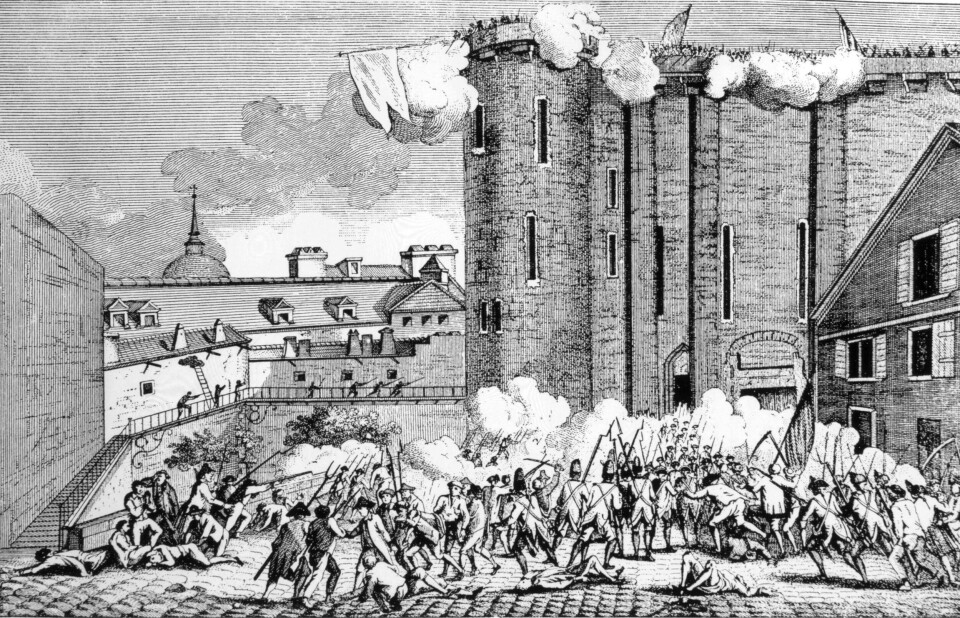-
Letters: France needs a new strategy to stop spam calls
Connexion reader says the new legislation will not work just as previous rules failed
-
Letters: VAT threshold reduction would hurt small businesses in France
Connexion reader notes that the additional tax burden would bring more bureaucracy with it
-
Comment: How France should respond to ‘bully’ Trump's tariffs
Columnist Simon Heffer looks at the effect the brewing trade war may have on France
Why has feeble victory at the Bastille become France’s national day?
It only freed seven prisoners but is now the symbol of French freedom

As everyone learns at school, when the fearsome Bastille prison was liberated by a Paris mob on July 14, 1789, it contained just seven miserable inmates: four forgers, two lunatics, and a notorious aristocratic rake.
Hardly enough on which to build a legend of liberty, equality and brotherhood.
So why do the French still mark this anti-climactic non-event as their national day of celebration?
Read more: La Fête Nationale- 14 facts to know about le quatorze juillet
Should they not choose a more significant date instead, such as August 26, the adoption of the Declaration of the Rights of Man and of the Citizen?
The Bastille stored gunpowder
To understand why the fall of the Bastille was so important, it is crucial to know that the building was more than a prison.
It was an arsenal and its attackers raided it to get gunpowder.
They were not interested in releasing prisoners. Rather, they wanted to finish the mini-revolution that had started in Versailles a short while before, when the Ancien Régime’s Estates General had transformed itself into a National Assembly in order to pass a constitution.
The King opposed a constitution
This constitution placed limits on the power of Louis XVI, who had hitherto ruled by divine right.
Louis did not want to agree and it became clear that the impasse was going to be broken only by force on the streets of Paris, not by words.
The king had to put down the growing rebellion before it got out of control.
The question was: would the king take back control of the city or would the city take control of the king?
The Bastille was the most conspicuous symbol of royal power in Paris and its capture would not only be a way of getting ammunition for assorted weaponry, it would also be a propaganda coup.
It would demonstrate the weakness of the monarchy and the strength of people – not just in words but in violence.
The Bastille was surrendered to the mob
Its fall was hardly a great, heroic victory.
The governor of the Bastille, the Marquis de Launay, decided to surrender on reasonable terms to avoid a long and bloody siege.
However, rumour got around that he had been planning to massacre citizens and for this supposed crime he was killed in the street by a rain of knives, swords and bayonets.
The details did not matter. The Bastille was in the hands of the mob and quickly transformed into a symbol of the success of the popular will.
Potent symbol of a captured castle
The Revolution would pass through many phases but talking in the assembly and passing declarations would never have the potency of the capitulation of a fortress.
Bits of masonry were sold off as souvenirs in the same way that fragments of the Berlin Wall would become collectable.
Even today, you can stand on the site of the Bastille and chant all the slogans you want.
You cannot do that with a parliamentary resolution or piece of paper.
It united revolutionaries for a while
More significantly, perhaps, there was a sense of moral clarity in events that day, which would be lost as factions fought over where the Revolution should go next.
The unity and euphoria certainly lasted for the rest of the summer but then things began to get more ambiguous: the flight and execution of the king divided the Revolutionaries; the Reign of Terror destroyed idealism; the empire of Napoleon brought back memories of autocracy and tyranny.
Birth of modern France
Plenty of people would regret these events but no one lamented the sacking and demolition of a castle-prison that had once incarcerated the great Enlightenment thinker Voltaire.
The fall of the Bastille is not without moral ambiguity but July 14 makes as good a date as any to separate the birth of modern France (that would culminate in the Fifth Republic) from the moribund ancient regime.
Related articles
What is the origin of France's July 14 bal des pompiers?
Forget the Revolution - a posh name will still take you far in France
French art: A portrait Marie-Antoinette hated and hid goes on display
























